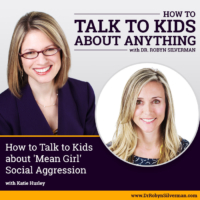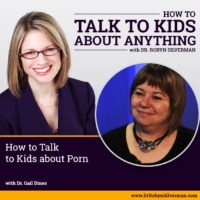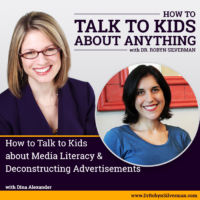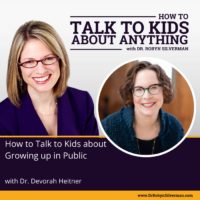Podcast: Play in new window | Download
Subscribe: Apple Podcasts | RSS | More
How to Talk to Kids about Trauma Recovery
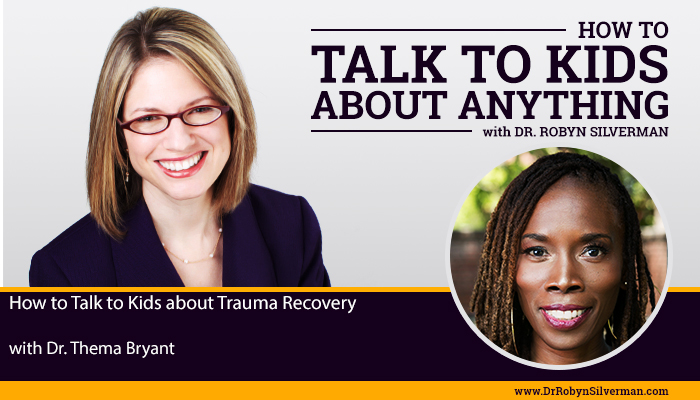
This podcast will focus on trauma recovery so that our children can find their home and focus on hope and heal. Whether it’s bullying, racism, sexism or some other kind of oppression, trauma is real and we need to help kids to process the feelings that go along with it and take action.
Guest Expert: Dr. Thema Bryant
Children deal with stress, disappointment and trauma often—in the form of discrimination, bullying, abuse, neglect and other stressors— how do we help them deal with the trauma instead of burying it, dwarfing it and hiding who they truly are so that they can simply survive? How can they acknowledge their trauma, express their toughest emotions and in a sense, “come home” to who they are, to their bodies, to their identities to themselves when something has been profoundly lost? For this understanding of trauma recovery, we turn to an amazing and insightful guest, Dr. Thema Bryant.
how do we help them deal with the trauma instead of burying it, dwarfing it and hiding who they truly are so that they can simply survive? How can they acknowledge their trauma, express their toughest emotions and in a sense, “come home” to who they are, to their bodies, to their identities to themselves when something has been profoundly lost? For this understanding of trauma recovery, we turn to an amazing and insightful guest, Dr. Thema Bryant.
Bio:
Dr. Thema Bryant is a clinical psychologist and president-elect of the American Psychological Association. She is also a professor of psychology at Pepperdine University and an ordained minister in the African Methodist Episcopal Church. Dr. Thema earned her doctorate from Duke University and completed her postdoctoral training at Harvard Medical School. With more than twenty years of experience in trauma recovery, she has appeared as a mental health expert on television, radio, and print media. Dr. Thema raises awareness about mental health issues on The Homecoming Podcast and her social media platforms. Her new book is called Home Coming: Overcome fear, and Trauma to Reclaim Your Whole Authentic Self.
Important Messages:
- What does home and homecoming refer to here and how do we know if we’ve lost our sense of home? So when we’re at home within ourselves, we are telling ourselves the truth and then living out of that truth instead of the scripts that other people give us. So often when kids or adults have experienced trauma, disconnect from themselves because they’re in survival mode of trying to figure out what do other people need me to be, or want me to be, or how do I have to act or talk or dress to be acceptable or to be safe. And so that can cause us to center everybody else and lose sight of our own voices.
- Disconnected or we’re not at home within ourselves: when you feel like you have to constantly pretend or perform for other people, when you’re in that place of lack of fulfillment or enjoyment, overwhelmed by anxiety.
- How do children reclaim those emotions and express them in healthy ways? A big piece is us coming home to our emotional selves. We cue our kids! (What do you miss doing? Pandemic). Sometimes we have in our minds, if they talk about the loss or the grief or the depression that, that erases everything. And so we’ll say things like, well, you know, you have it better than a lot of kids. Well, it doesn’t mean that they still don’t miss whatever it is they’re missing. Must check in with our children and talk about it and be more expressive about our own emotional lives.
- Sometimes as a parent myself, we, we are almost afraid to kind of get into the ugly emotions because we don’t want to trigger an emotional spiral down. We hide an avoidance for our own comfort. Remember- You’re creating a safe space for them to name what’s already present.
- We hide an avoidance for our own comfort but just because I don’t talk to my child about it doesn’t mean those negative feelings have gone away. It just means I don’t have to be uncomfortable with hearing about it.
- So what happens?
- They then turn to their peers or
- They turn inward on themselves.
- Truth: You asking them, the question is not what’s making them depressed. You asking them is not what is creating the anxiety. You’re creating a safe space for them to name what’s already present.
- We often hear about parents saying, you know, “I don’t want to talk about sex because it’s going to give them permission to do it. I don’t want to talk about LGBTQ because it may make it seem like I’m saying ‘you should be gay.’
- Parents- fears and their discomfort coming out in what they are trying not to talk about. But no matter what you are thinking, they may be talking about it already. They may be thinking it already. They may ‘be it’ already. And you not talking about it, doesn’t negate what’s actually happening here. Right?
- CHECK IN WITH SELF: So we can even check in with ourselves to think about a time when you felt something and never told anybody. You know, so we go through that, those emotions of that emotional mask of how are you? I’m fine. How are you? Fine. And meanwhile, we’re like having the toughest time so we can remember the silence doesn’t relieve it. So let’s show up with support.
- Kids- Coping with trauma (avoiding talking about it), racism or sexism or homophobia or bullying or abuse or neglect. What are some key steps to helping them cope with the trauma mm-hmm in a productive way? (1) Books. Bibliotherapy. Books with kids whose parents have gone through divorce or the loss of a parent or a grandparent or, uh, being bullied and rejected. And so then we can start our conversation about the book, right. So, you know what happened with the kid in this story? You know, what, what do you think he was feeling or what did they do? Would that work in your school? (2) Art. Play. Paying attention to what happens when they’re creating these scenarios, do people just get mad at each other and go quiet? Throw the doll to the side and we’re done with it? What would happen if this doll could say something else? Arts: Collage making. Story. Kids had been told by the mother, don’t tell people our business. We don’t talk about it. We’re just moving forward. By bringing in the magazines, the glue, the scissors, and just having them to be able to create the images and the words without having to give me all the specifics, was an entry way.
- Bringing them through another door get them into yours.
- In your book, you said women, people of color, LGBTQ+ community members, people with disabilities and the impoverished among others, it is a radical act to be still and care for yourself in a society that has bombarded you with messages of your unworthiness. And you talk about the need for both self care and community wellness, as an answer. For kids who are facing these challenges, feeling stuck and powerless- what can they do?
- “When you are a marginalized, minoritize- there can be this pressure to always be to be perfect, to perform because you feel like you’re representing your whole community. You’re representing all children with disabilities, you’re representing all children of a particular race or ethnicity. And so that’s a lot of pressure to put on some little shoulders. And sometimes you will have parents who will tell those children out of desire for them to succeed, that you have to be twice as good, that you can never let people see you, slipping. There’s this feeling of perfectionism. And so it’s important to create spaces for your child, where they don’t have to be the only one where there can be a sense of, I can be me without needing to be kind of this one person warrior.
- Summer camp: If in community, African American population is small, but found this beautiful summer camp that was focused on African American art and culture. So during the school year in my daughter’s classes, there might be like two or three black students in the class. And then in the summer, she’d go to this camp where it’s all immersed in like the beauty, the wonder that just gifts of, of your heritage, right. To know yourself and be comfortable with yourself and, you know, taking her to the MLK March and parade and seeing that. And that was the first time she heard the song James Brown song say it loud, I’m black and I’m proud.
- Or I think about a friend who’s white who had adopted a black child and talked about being intentional of driving farther to get to a beach where there was more diversity. Setting that intention to, for community. There are things we can do internally and we want to do those strategies, but also what a gift to be in a community that cares about you.
- Get perspective as a parent to be the minority. Research on adoption- And one of the things that was said was that a white parent of a, another race child, who’s another race needs to understand that what it feels like to be a minority and to put themselves purposefully in a situation where they are the minority and their, their child is the majority and feel that shift so that the child can feel enveloped by a community, whether it’s moving to a community where there are more people of color or going to a school with more people of color or, or a sports team or whatever you’re saying about going to the camp or whatever, I find that, that so important. And then also to get the perspective as the parent to feel like the minority.
- Important to be tuned in and paying attention as opposed to that prior notion that many people had ‘we don’t see their race.’ They’re just my child and that erasure of culture or heritage or identity versus recognizing it, celebrating it. And seeking out spaces where, your child sees more of themselves reflected.
- Self-confidence and in particular on mistakes and failure, feels like it can ruin your future. “Failure is an event, not an identity.” I am statement– how are you defining yourself? Whose voice is that? Who fills in the blank for you when it’s especially negative? You ask your readers to refrain from defining themselves by shortcomings and instead by growth and how far they’ve come, new knowledge, new habits. Kids are often defined by the identities that they are told by parents and friends and teachers who they are, who they’re supposed to be in comparison to others (you are not as smart as your brothers, you’re the pretty one or within themselves, you are lazy, you’re stupid, you aren’t good at soccer). So how do we help our kids redefine themselves based on strengths and how far they’ve come instead of by the mistakes they made by their failures and other deficit based identity markers.
- Psychologists have found in the research is that when you just call kids gifted- when they advance to either middle school or high school and for the first time or even college, and for the first time it’s a stretch or it’s challenging, then they think, well, I’m just not smart enough. Or I guess I’m just not gifted and they give up. Instead, “I worked really hard on that book report and look how it turned out.” Appreciate the labor, the effort, the child and the action- instead of going towards the labeling.
- Label selves: “Soccer- it was so hard and I stink at it.” Both are true. It didn’t come easy. AND I’m glad you passed! Not either or or. People don’t see the other pieces. So then they have in their minds that you’re a success. So either I’m a success or I’m a failure. And so to be able to say, I didn’t get everything I applied for. Share your process- not just the result. Share your stories of failure. Share your humanity.
- “You afro is weird” or “being a member of the LGBTQ plus community is a sin” or “being adopted means that you weren’t wanted” or “being Jewish means you’re going to hell.”
- (1) Comfort and Validation. Sometimes we jump to the problem solving and the solution, and first it’s that like, my heart is hurt. And it may be even my self-esteem or identity is hurt about my hair or about my religion or about my sexuality. “That should not have happened.” Comforting. (2) Larger picture. “Unfortunately in our world, a lot of people have been, mistreated in the past and in the present based on their race or their hair or their facial features, or all of these different things. And people learn that. It’s very likely this kid heard that from somebody else. They weren’t just, you know, people think they’re saying random things like, oh, he just didn’t like my hair. “There’s a history to that.”
- Prepare them: Sometimes parents are afraid if I show them the bigger picture, it’s going be depressing or create insecurity for them. But no. It’s “racial socialization” or “gender socialization.” It, it actually prepares them. So they don’t take everything as being, “just picking on me” as an individual that “something is wrong with me.” So helping people to know that larger landscape, and then we can look at what are the different solutions. So this time it caught you off guard. Have compassion for yourself about how you did respond.
- Responses: (1) Some people join in the laughing at themselves, people are teasing them and they are laughing with them because they’re embarrassed or (2) they started crying and they feel embarrassed because they cried. (3) or they started fighting, they were angry. So we can look at how you did respond in the moment and then what are some different options or if something like that, either to address what already occurred or going forward, if someone says, or does something like that
- Advocate: Willing to be an advocate and show up for them. Would they like to handle it with this kid? Or would they like me to come to the school to speak with the kid, the kid’s parents, the teacher who maybe was present and did not intervene. “You have been treated in a way that is wrong and I want to support you in making it right.” Showing up and being supportive.
- Teacher talked to child- and concluded that the person who was doing the teasing could have said it to anyone. Parent wasn’t happy so wound up finding a new school for the child for the next year with more diversity. What would you suggest as next step?
- “I would like your staff and teachers to have a training about microaggressions and about racism” (either I can, if it’s in your wheelhouse, I can help to identify for you.”) Because when people aren’t aware, then they are a part of the problem. So even if a teacher has not said something harmful to my child, the excusing it and the dismissing it and the being quick to dilute it. So his version of the facts is now truth. And my child’s version of the facts “they were just being sensitive or they misunderstood.” So why is my child not being believed?
- What to say in the moment of microaggression: If safe, based on personality of the child. “I’m not gonna be disrespected about my hair” or “it sounds like you don’t know beauty when you see it” “You’re so mesmerized by my hair. You’re amazed. I know my hair is amazing. People don’t know what to do it. In awe.”
- Personality of bully vs the person is picked on. Stunned into silence? Take it up a notch?
- Coping with wounds of oppression: (1) Internalized oppression: Come to believe the lies they’ve been told. “if you’re raising a daughter who is now saying all this kind of sexist language of like, ‘I don’t like to play with girls, cause girls are petty or girls are stupid.’ Some people are getting those messages from their own parents. I had an adolescent girl I was working with whose father told her, “be friends with boys and not girls because girls are…” Right. I see them embodying that, or let’s say now hating their hair or hating their skin or hating themselves, um, then it is about healing. “Culture as medicine.”
- “Learning the truth about who you are.” If the only thing people hear is the negative and of course they would feel negative about their identity. So if we are silent and then from this other group, they’re hearing terrible things, where are they getting the positive messages about their sexuality, their gender, their disability, um, their religious background, you know, their race.
- THE WAY WE HEAL– it is with truth that even though there are people who, will reject you or despise you or judge you because of your identity, this is the truth about who you are. And hopefully helping them to get that message, not just from us, because sometimes they’ll say, ‘oh, you’re my mom. You have to say that.’ Getting them in, in spaces where they can hear that message from multiple people.
- And then I would say becoming a part of advocacy or activism and you see children doing this in diverse ways. Whether some people will take their kids with them to a March or a protest, uh, there’s something called artivism. So using their artistic expression or if they have the opportunity to write a report for like social studies or history writing about your community or your identity and the resilience of that group, or, do you know if they got money for a holiday, they want to donate part of their money to some group that’s dedicated to one of their identities. So helping them to feel empowered is a part of the healing.
- What about the child who is in a home or a school that they can’t divorce themselves from, and they are getting those continual messages from a parent and a teacher’s listening to this and going, what am I supposed to do to unwind that or vice versa where a parent is like, my child is in a school where they’re constantly getting these messages and I can’t take her out. There’s nowhere else for my child to go, in this situation, there’s not a close school. This is it. This is what’s here. So in if a child is being abused, neglected, discriminated against, and it feels like there isn’t a way out as, as a, an onlooker mm-hmm how are we to help in that situation?
- School: Get active and involved in creating the solution. So I’ll say at one of my kids elementary school, um, you know, the first February, you know, it was black history month and I’m kind of waiting and watching and like seeing like nothing is happening. So I contacted the school and said are you all having some kind of like black history program or something? And they said, no. So I said, can I do one? We brought in drummers, we brought in dancers, we did storytelling. And so then they made me the committee of one.
- It also sparked some of the other identity group, parents to say “we should do something for Latino heritage.” Or American Indian.
- I had another experience with, uh, my eldest where, uh, the English teacher was exhibiting some very problematic behavior and assignments around race and gender. And so going above their head. The administration- this is unacceptable. And it turned out, I was the only parent that had complained. So other kids complained among themselves, but either had not said anything to their parents or their parents had not contacted the school. So when the school found out what was happening, were embarrassed, upset, and then said, of course teacher’s not fired- they’re gonna mentor him and have him rework the syllabus. And so then suddenly, she was getting all these assignments on the Harlem Renaissance and black authors. If we have to stay in the system, how can I shift the system? How can I at least identify some people in the system who are safe, who are going to look out for my kid?
- And then if you are the teacher and you’re seeing the dynamic is with the parents, I would say try to pour affirmation into the kid. And then if possible, not in an antagonistic way, if you can try to build relationship with the parents, plant those seeds, because often they’re repeating their own stuff of what they were taught. “ I’m trying to shift not only the kid, but the family,” if that’s where the issue is.
Notable Quotables:
- “When we’re at home within ourselves, we are telling ourselves the truth and then living out of that truth instead of according to the scripts that other people give us.”
- “Sometimes we have in our minds, if our children talk about their loss, grief or depression that, that erases everything. So, we’ll say things like, ‘you know, you have it better than a lot of kids.’ Well, it doesn’t mean that they still don’t miss whatever it is they’re missing.”
- “So often when kids or adults have experienced trauma, they disconnect from themselves because they’re in survival mode of trying to figure out what do other people need me to be or want me to be? How do I have to act or talk or dress to be acceptable or to be safe? And so that can cause us to center everybody else and lose sight of our own voices.”
- “Emotional homelessness”
- “Our silence often communicates, ‘I don’t want to hear it.’”
- “We hide in avoidance for our own comfort.”
- “Because I don’t talk to my child about it doesn’t mean those negative feelings have gone away. It just means that I don’t have to be uncomfortable hearing about it.”
- “When you are a marginalized minority- there can be this pressure to always be to be perfect, to perform because you feel like you’re representing your whole community. You’re representing all children with disabilities. You’re representing all children of a particular race or ethnicity. And so that’s a lot of pressure to put on some little shoulders. And sometimes you will have parents who will tell those children out of desire for them to succeed, that ‘you have to be twice as good, that you can never let people see you, slipping.’ There’s this feeling of perfectionism. And so it’s important to create spaces for your child, where they don’t have to be the only one– where there can be a sense of, ‘I can be me without needing to be a one person warrior.’
- “Failure is an event, not an identity.”
- “For as parents and adults, let’s be cautious about going towards labeling and instead, just appreciate the behavior and the action.”
- “When parents share their humanity, it gives more room for it.”
- “You have been treated in a way that is wrong and I want to support you in making it right.”
- *Kids need ‘culture as medicine.’ That is, they need to learn the truth about who they are. If the only thing people hear is the negative, of course, they would feel negative about their identity. So, if we are silent and then from this other group, they’re hearing terrible things, where are they getting the positive messages about their sexuality, their gender, their disability, their religious background, their race?
- “The way we heal is with truth that even though there are people who, will reject you or despise you or judge you because of your identity, this is the truth about who you are.”
- “If we have to stay in the system, how can I shift the system? How can I at least identify some people in the system who are safe, who are going to look out for my kid?”
- “We want to say to our kids, ‘you’re already enough and that you’re already worthy.’ We want our kids to not feel that they have to earn our love or our attention. We want them to feel and know that nothing that was done to them, including the trauma, erases their worthiness, erases, uh, their value, erases our love for them. And that is healing.”
Failure is an event- not an identity, says @DrThema on the #talktokids podcast. Listen in as we explore what she calls emotional homelessness as well as helping our kids achieve trauma recovery
Click To Tweet
How do we help kids move forward after trauma?The amazing @DrThema on the #TalktoKids podcast gives us tips and scripts–>
Click To Tweet
Resources:
- DrThema.com
- Book: Homecoming: Overcome Fear and Trauma to Reclaim Your Whole, Authentic Self
- IG: @Dr.Thema
- Twitter: @DrThema
- TikTok: @DrThema
The post How to Talk to Kids about Trauma Recovery with Dr. Thema Bryant appeared first on drrobynsilverman.com.

